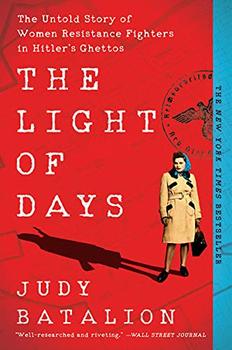Summary | Excerpt | Reviews | Beyond the Book | Readalikes | Genres & Themes | Author Bio
The Untold Story of Women Resistance Fighters in Hitler's Ghettos

Critics' Opinion:
Readers' Opinion:
First Published:
Apr 2021, 576 pages
Paperback:
Aug 2022, 592 pages
 Book Reviewed by:
Book Reviewed by:
Debbie Morrison
Buy This Book
In the decades between world wars, growing antisemitism and poverty brought about a collective depression among Polish Jewish youths. They felt alienated from their country, their futures uncertain compared with those of their forbears. Jews were not allowed to join the Polish Scouts, and so a hundred thousand joined Jewish youth groups affiliated with the different political parties. These groups provided existential paths and hope for the future. Jędrzejów's young Jews participated in a thriving youth group scene. In some photos, members wear dark colors and pose as sober intellectuals, arms crossed; in others, they stand outdoors in open land, gripping rakes, muscles flexed, tanned, and flushed with life.
Like her father, Sarah was a Zionist, but unlike Moshe, she belonged to Freedom, a group of secular, socialist Labor Zionists. Mainly middle class and worldly, Labor Zionists hoped for a homeland where they would live in collectives, speak Hebrew, and feel a sense of belonging. While they encouraged reading and debate, physicality was also prized as a way to denounce the myth of the slothful, intellectual Jew and to promote personal agency. Engaging in manual labor and contributing to the group's resources was paramount. They idealized the working of the land; agricultural self-sufficiency went hand in hand with communal and personal independence.
There were several Labor Zionist youth groups—some more intellectual or secular; others devoted to charity, advocacy, or pluralism—but all took traditional Polish values of nationalism, heroism, and individual sacrifice and gave them a Jewish context. Freedom focused on social action and, uniquely, drew members from the Yiddish-speaking working class. The group established summer camps, training camps (hachshara), and communal farms (kibbutzim) as preparation for emigration, teaching hard labor and cooperative living—often to a parent's dismay. Not only did Moshe bemoan Freedom for being overly liberated and insufficiently elite, but also "comrades" were prioritized over the birth family, with leaders treated as role models—almost like surrogate parents. Unlike the Scouts or sports organizations, these youth movements touched every part of their members' lives; they were physical, emotional and spiritual training grounds. Young people defined themselves based on their group.
Sarah championed social equality and justice, and was especially keen on counseling young children. The Ghetto Fighters' House Museum holds several photos of her at a training camp in the city of Poznán, two hundred miles from Jędrzejów, in 1937. In one, she stands tall in front of a statue, wearing a tailored suit with a high collar, her hat tilted modishly to the side; she holds a book, serious, determined. The modern world was hers for the taking.
Women in Poland held both traditional and progressive roles, spurred on by a positivist education philosophy and by World War I, which had pushed them into employment. In the new republic, elementary school was mandatory, including for girls. Universities were opened to female students. Polish women received the vote in 1918, before most Western countries.
In western Europe, Jewish families were largely middle class and constrained by broader bourgeois mores, with women relegated to the domestic realm. But in the East, most Jews were poor, and out of necessity, women worked outside the home—especially in religious circles, where it was acceptable for men to study rather than toil. Jewish women were enmeshed in the public sphere: in 1931, 44.5 percent of Jewish wage earners were female, though they earned less than men. The average marriage age was pushed back to the late twenties, even thirties, largely due to poverty. This resulted in declining fertility and, in turn, women in the workplace. In fact, to some degree, their work-life balance resembled modern gender norms.
Excerpted from The Light of Days by Judy Batalion. Copyright © 2020 by Judy Batalion. Excerpted by permission of William Morrow. All rights reserved. No part of this excerpt may be reproduced or reprinted without permission in writing from the publisher.




The dirtiest book of all is the expurgated book
Click Here to find out who said this, as well as discovering other famous literary quotes!
Your guide toexceptional books
BookBrowse seeks out and recommends the best in contemporary fiction and nonfiction—books that not only engage and entertain but also deepen our understanding of ourselves and the world around us.